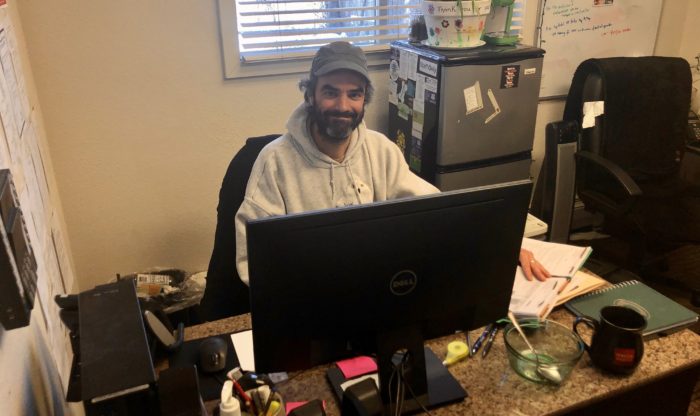
The support of a case manager in the path toward permanent stability
Homelessness. A stark, lonely, scary sounding word. A word so heavy that its solutions seem too ambiguous to comprehend. Homelessness is a complex issue, and these complexities cause some to shy away from working toward a solution. Finding a solution to homelessness requires time and openness. In order to work toward a solution for homelessness we must first better understand it.
A good way to better understand homelessness is by talking to the direct care providers who are working with clients experiencing homelessness. This article is the first of a multiple part series called “Conversations with Case Managers” where we will highlight different case managers at Catholic Social Services and their observations, stories, and reflections while working with clients.
This conversation was with Catholic Social Services Case Manager, Ian Colbert, who has worked with many clients experiencing homelessness at Clare House and the temporary mass shelter in Anchorage. Case Managers are trained professionals who provide direct care to clients. Catholic Social Services provides training for Case Managers in trauma informed care, social and emotional support, and motivational interviewing to best serve clients.
The trauma of homelessness
Many of Ian’s clients have experienced or are experiencing chronic homelessness. Those experiencing chronic homelessness have been in homelessness for over a year, or repeatedly, while struggling with a disabling condition. When asked about chronic homelessness, Ian spoke about the trauma of homelessness, the living conditions of the homeless community, and the barriers between homelessness and permanent stability.
The perception that getting out of homeless is a quick and easy process of finding a job and finding housing is deeply flawed. Ian testifies that it is much more challenging than that. He has learned this firsthand from his time working at Catholic Social Services. People who are experiencing homelessness have often experienced significant trauma in their lives. Not only have many of his clients experienced past trauma, they are also currently experiencing trauma in the form of homelessness.
Ian speaks about what it’s like to experience trauma and how to work through it, “To cope with trauma, you are usually in survival mode. When you’re in survival mode, even the thought of leaving is traumatic. All you can do is focus on your given situation and the day you are living. It takes a lot of healing and time to think ahead and plan from the current situation you are in.” This type of planning and emotional and social support is what case managers like Ian do daily, and therefore they are able to help clients climb the ladder out of homelessness and to permanent stability.
Previous and current trauma is a large obstacle for clients to get to permanent stability, and it is not the only obstacle to overcome. There are so many other barriers on the path to permanent stability for Ian’s clients. These barriers can be things like not having an ID, no birth certificate, or not having a credit score. These barriers can also be things like past criminal offenses, substance misuse, mental illness, or a physical barrier. Ian says all these barriers can make clients feel as though they are an outsider to society and can make the transition to permanent stability that much more difficult. That’s why in order to reach permanent stability clients must be ready to be housed, and case managers must provide ongoing and in-depth support.
Adjusting to life in permanent housing
Ian continued, explaining the transition from living in homelessness to permanent housing, “Once a client is ready to move into housing and out of shelter or camps, they then must relearn how to function in society.” Ian described the transition from homelessness to housing as a complex and very difficult learning curve. “When homeless, you have adapted to a standard of living that is not acceptable, but somehow it has been deemed so.” You must relearn social norms and what it’s like to live on your own. Helping clients transition to housing is another key part of a case manager’s duties.
This transition is especially difficult because many clients can experience extreme loneliness and depression when first moving to their own permanent housing. When experiencing homelessness, individuals are often living with the same group of people for months, if not years. These people become family and are soon a strong support network. When a person leaves that network and that community, it can be very lonely. This loneliness can then lead to substance misuse and back to homelessness. That’s why it’s extremely important for case management to continue to provide social and emotional support long after clients become housed
Permanent stability
Each client is different, and they face many challenges, even outside of those mentioned here. Individualized care and support are critical pieces of case management at Catholic Social Services to tailor to those differing needs.
As you can see, moving out of homelessness is not as simple as finding a job and an apartment. Case Managers like Ian are an emotional and social support person for clients, a personal cheerleader of sorts. Someone always there, cheering on clients, providing resources, and helping them overcome each obstacle in their way. Though these challenges and barriers are great, our clients are resilient, they are determined, and they will succeed.
I am currently living at the guest hotel downtown from a grant I received from Cook inlet tribal council prior to this I was homeless I am inquiring about the bezos funding or any funding that I can acquire that would help me secure a residence please contact me at 907-538-5512 I’m currently working with southcentral foundation CITC and the Anchorage coalition for homeless I’m asking your assistance in any way you can give it thank you. Jessica
Hi Jessica, Thank you for reaching out. We will get your information to a case manager so that they can assist. – CSS